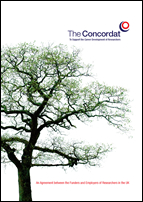 I am delighted to share with you BU’s new Code of Practice for the Employment and Development of Research Staff. Research staff in this context are defined as staff with a primary responsibility to undertake research, including pre-and post-doctoral staff on fixed-term and open-ended contracts funded through limited period grants, named fellowships and sometimes institutional funds.
I am delighted to share with you BU’s new Code of Practice for the Employment and Development of Research Staff. Research staff in this context are defined as staff with a primary responsibility to undertake research, including pre-and post-doctoral staff on fixed-term and open-ended contracts funded through limited period grants, named fellowships and sometimes institutional funds.
The code provides guidance on the University’s expectations for the recruitment, support, management and development of research staff in line with the Concordat to Support the Career Development of Researchers (2008) and the European Charter for Researchers (2005). It is relevant to research staff and their managers as well as to BU staff in general. It has been written by the University’s Research Concordat Steering Group and is one of the objectives from our action plan to further align BU’s policy and practice to the seven principles of the Concordat and to further improve the working environment for research staff at BU.
This is the first time that BU has had a code of practice specifically for research staff and the document acknowledges the valued contribution made by research staff to the research undertaken at BU. The further recognition of the value of research staff and the development of career opportunities for them are key matters on which we will continue to work.
Access information about BU’s work to embed the principles of the Concordat here: http://research.bournemouth.ac.uk/research-concordat/












 From Sustainable Research to Sustainable Research Lives: Reflections from the SPROUT Network Event
From Sustainable Research to Sustainable Research Lives: Reflections from the SPROUT Network Event REF Code of Practice consultation is open!
REF Code of Practice consultation is open! BU Leads AI-Driven Work Package in EU Horizon SUSHEAS Project
BU Leads AI-Driven Work Package in EU Horizon SUSHEAS Project ECR Funding Open Call: Research Culture & Community Grant – Apply now
ECR Funding Open Call: Research Culture & Community Grant – Apply now ECR Funding Open Call: Research Culture & Community Grant – Application Deadline Friday 12 December
ECR Funding Open Call: Research Culture & Community Grant – Application Deadline Friday 12 December MSCA Postdoctoral Fellowships 2025 Call
MSCA Postdoctoral Fellowships 2025 Call ERC Advanced Grant 2025 Webinar
ERC Advanced Grant 2025 Webinar Update on UKRO services
Update on UKRO services European research project exploring use of ‘virtual twins’ to better manage metabolic associated fatty liver disease
European research project exploring use of ‘virtual twins’ to better manage metabolic associated fatty liver disease